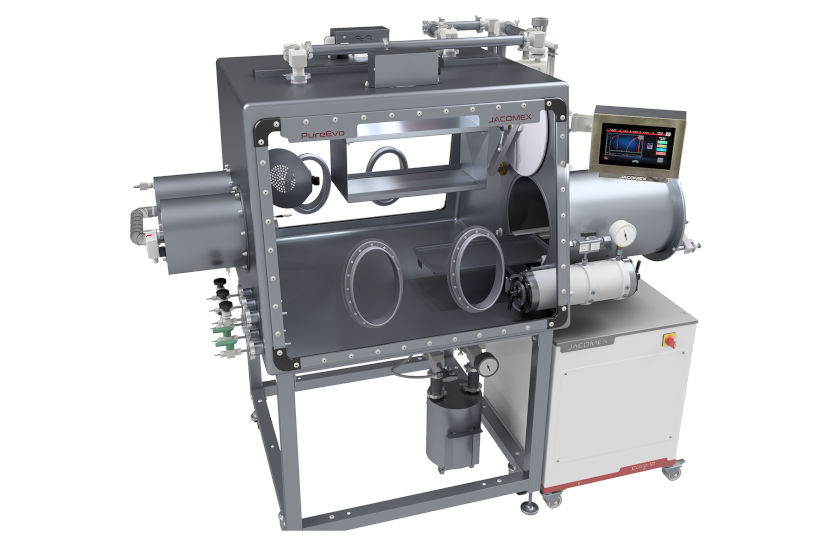Key Features of Glove Boxes for Battery Research
At Jacomex, we understand the critical importance of gloveboxes in battery research. Our products are designed to provide essential functionality to meet the specific requirements of this field.
Atmosphere Control
Our gloveboxes ensure rigorous control of the atmosphere inside, an essential feature when handling sensitive materials such as lithium. The ability to maintain a stable environment, free from humidity and oxygen, prevents undesirable chemical reactions and contamination of samples.
Advanced Filtration Systems
We incorporate state-of-the-art filtration systems into our gloveboxes. These systems effectively remove impurities and particles, ensuring the purity of the materials handled and the reliability of experimental results. This functionality is essential for the critical stages of battery research, such as the synthesis of new materials and performance testing.
Ergonomics and Safety
Our glove boxes are designed with ergonomics and safety in mind. They feature integrated gloves that allow direct and precise handling of materials, while ensuring complete isolation from the external environment. This ergonomic design is crucial for delicate operations and helps to improve the safety and efficiency of research processes.
In short, our gloveboxes play an indispensable role in battery development and analysis, enabling significant advances in this constantly evolving field. At Jacomex, we are committed to providing solutions that not only meet the current needs of researchers but also anticipate the future challenges of battery research.
Importance of Isolators in Research Environments
Isolators, like glove boxes, play a vital role in research environments, particularly in the field of batteries. They are essential for maintaining a sterile and controlled environment, which is crucial when handling highly reactive or dangerous substances. These hermetically sealed systems offer unrivalled protection against cross-contamination, ensuring the integrity of samples and the safety of researchers.
The ability of isolators to create a perfectly controlled environment is particularly beneficial for sensitive processes such as the synthesis of new battery materials or the testing of cells under extreme conditions. They allow precise handling of air-sensitive components, such as electrolytes or electrodes, minimising the risk of alteration or degradation due to exposure to air or humidity.
In addition, the isolators are equipped with advanced filtration systems, which ensure a particle-free atmosphere, essential for obtaining reliable and reproducible experimental data. This feature is vital to the development of better and safer battery technologies, as it helps to avoid errors and inconsistencies in research results.
In short, isolators are a central pillar in battery research laboratories. They contribute not only to the safety and efficiency of research procedures, but also to the advancement of knowledge and technologies in this dynamic and constantly evolving sector.
Developments and Prospects in the Use of Gloveboxes and Isolators for Battery Research
The field of battery research is constantly evolving, driven by the growing demand for more efficient and sustainable energy solutions. In this context, the use of glove boxes and insulators has also evolved, with significant advances in both their design and application. These developments reflect the scientific community’s ongoing commitment to improving the safety, precision and efficiency of research.
Recent innovations in gloveboxes and isolators focus on improved atmosphere and contamination management, measurement accuracy, and the integration of automated technologies and advanced control systems. For example, new humidity and oxygen control systems now enable even more precise levels of control, essential for research into next-generation battery materials.
At the same time, the adoption of automation and artificial intelligence in the management of gloveboxes and insulators is opening up new horizons. These technologies enable real-time monitoring and control of experimental conditions, optimising research processes and reducing the risk of human error.
In the future, we can expect this equipment to become even more sophisticated, with enhanced functionalities to support research into better-performing, safer and more environmentally-friendly batteries. This ongoing evolution of gloveboxes and isolators will play a crucial role in the realisation of the next generations of battery technologies, paving the way for revolutionary advances in this vital field.
Jacomex: A Key Player in the Supply of Glovebox and Insulator Solutions
At Jacomex, we are recognised as a key player in the supply of innovative glovebox and isolator solutions, specifically tailored to the requirements of battery research. Our expertise lies in the design and manufacture of equipment that cobines state-of-the-art technical performance, reliability and ease of use, meeting the precise needs of researchers and engineers in this field.
Our product range features advanced atmospheric control systems, essential for maintaining optimal and precise conditions in gloveboxes. These systems ensure extremely precise regulation of humidity and oxygen, an essential feature for experiments involving sensitive materials. We incorporate state-of-the-art filtration and purification technologies, ensuring maximum protection of samples from contamination.
We are also committed to providing outstanding customer service and technical support. We offer personalised assistance with the installation, training and maintenance of our equipment, ensuring that our customers can take full advantage of the capabilities of our gloveboxes and isolators. This level of support is essential in research environments where accuracy and reliability are paramount.
Our close collaborations with various research institutes and companies in the battery sector illustrate our indispensable role in supporting scientific advances. By providing state-of-the-art equipment and high-quality technical support, we actively contribute to the development of more advanced, safe and efficient battery technologies, playing a crucial role in the advancement of this vital sector.
















